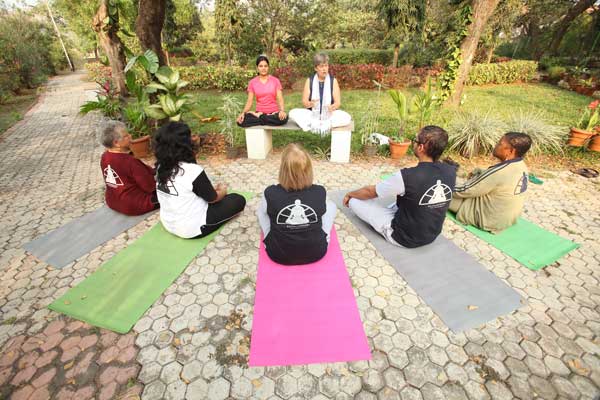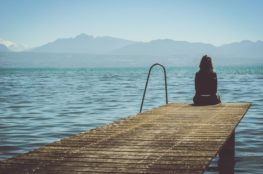HOW IT ALL STARTED
From now on I will be posting every two weeks. I will start from the beginning, with excerpts from the interview I did with a friend of mine, Marion Cirone, founder of Integrative Cancer Review (www.integrativecancer.org). After that, I will be covering numerous subjects connected to yoga and yoga therapy. If you would like me to cover any of particular subjects – please contact me at info@yogaforhealth.institute
How did you first get into yoga for yourself and as a teacher?
I came to yoga without knowing that what I do is yoga. In the late 1980s, I stumbled into meditation, which I think saved my life at the time. I started to meditate religiously, three times a day. At the same time, I discovered my highly effective ability to heal with energy. I studied privately with a well-known healer, did Therapeutic Touch training, became a Reiki master and saw patients –all while I was a manager in a corporate world.
Fast-forward about ten years, and I found myself in a yoga ashram in Trinidad. At the time, I had no idea what an ashram was or what a guru was. I went there for a three-week invited visit and ended up staying 3.5 years, studying personally with a Kundalini Yoga master.
I would still be there if it weren’t for my breast cancer diagnosis, which brought me back to Canada. I went through full-fledged traditional treatment, which was so devastating that if it wasn’t for yoga, I would have simply checked out.
After my treatment ended, I found myself teaching yoga to cancer patients, to yoga enthusiasts and to youth with mental challenges. I noticed that everyone benefited and felt much better after doing my asana classes for some time. This confirmed my conviction that yoga has tremendous therapeutic potential and I decided to come to India to find out more from the horse’s mouth, so to speak. This is how I landed at Kaivalyadhama Yoga Institute in India to study. As life would have it, before I finished my studies, I created and started to run the Beyond Cancer Retreat and then the Chronic Cures program at the Kaivalyadhama Yoga Institute.
Today, I am an IAYT-certified yoga therapist (International Association of Yoga Therapists), live and work in Toronto, Canada and visit Kaivalyadhama Yoga Institute as the Senior Yoga Therapist. I also travel around the world, speaking at conferences, teaching teachers what and how to teach yogic techniques to cancer patients, offering workshops and Beyond Cancer programs.
Lee, how did your own experience with cancer lead you to create the Beyond Cancer Retreat at the Kaivalyadhama Yoga Institute in India?
The idea started as a possible research project on yoga and cancer. This required a protocol, which came to my mind when I remembered my own experiences with a gap in cancer treatment in Canadian health care system. I also was determined to use ALL yoga tools, not to limit myself only to asanas (postures) in designing the protocol, as I knew that most of the research so far was done only either on asanas or on meditation.
Typically, after surgery cancer patients undergo chemotherapy and radiation, which may last from four weeks to a few years. Often such intensive treatments result in severe side effects – mental and physical fatigue, cognitive dysfunction (brain fog), depression, mental confusion and loss of short-term memory.
Such was my case. At the end of my treatment in 2008, my body was completely exhausted and my mind was shut down. I couldn’t focus enough to read a paragraph in the book. I was severely depressed and I had no awareness of it. I was fatigued, and strangely, had no short-term memory. I was wondering – how am I going to live the rest of my life? When my oncologist said to me “this is the end of the treatment – we did everything we could for you. Now it is time for you to live your life again!” I looked at him and wondered – WHAT LIFE?
I remembered my husband’s ordeal. After going through triple bypass he was released home in four days, which was followed by six months of intensive therapy. I realized that there is a great gap in the healthcare system, which drops cancer patients at the end of treatment–when they feel the worst and need the most support and information on how to recover.
The end of the treatment means usually the accumulation of toxicity in the body, which results in most severe side effects. The treatments are long and the side effects creep in on us very slowly, and so we often have very little awareness of our state. No wonder that over 80% of patients suffer from depression after ending their treatments. We felt terrible for a long time and we do not know if/when we will feel any better…
My presence at the Kaivalyadhama Yoga Institute in India opened an opportunity to fill this gap by creating a comprehensive program based on yoga principles. Thus, I created the Beyond Cancer retreats in 2013, a program that picks up patients at the moment when they are at their lowest–after finishing the treatments. We have been running these retreats for four years now–with wonderful effects. My mission now is to take these retreats out of India and make them available in other countries.
Can you tell us more about your retreats for cancer patients and survivors?
My intention was to fill in the gap in health care for all in need. This meant for all cancer patients in all stages of cancer. Because there is such a wide variety in cancer cases and because yoga therapy lends itself to highly individual approach, we limit the number of participants in a given retreat to a maximum of 8 at a time. We designed a very comprehensive protocol, with six days per week of yogic practices, including the following each day:
- 1 hour of gentle asanas
- 1 hour pranayama (breath management techniques)
- 1 hour meditation
- 1 hour Yoga Nidra (deep relaxation)
- 30 minutes of chanting
- 1.5 hours of lecture or group work
- 30 minutes of yogic counseling upon request
We accept patients with all cancers at all stages, providing they can move about independently. Most of them are coming within 12 months after finishing treatments. Most of them also are coming with severe side effects of chemotherapy and radiation – high level of tension, depression, anger, fatigue and anxiety, and with an attitude of victim well entrenched in them by the healthcare system. So, there is a need for a high level of individual support.
The retreat is residential – one stays and works together in the same small group for three weeks, which in itself becomes a therapeutic tool.
Typically, we spend the first-week helping patients to settle into the routine of the day. By the end of the first week or the beginning of the second, depending on the patient’s earnestness, we see them going through some kind of crisis. The yogic practices start working, and their pain connected to treatments and the fact of having cancer is coming out. Their long-held negative emotions are coming out. Their rigid attitudes are challenged. They are forced out of their established comfort zones to where they have to face themselves.
We help them to meet such challenges by teaching them appropriate yogic practices and by supporting them with counseling sessions. We hold the space for them so that they can feel supported in meeting their inner challenges. We help them to reconnect with their bodies. We teach them yogic tools to deal with their strong negative emotions. We help them to become aware of their routine negative thought processes and teach them how to change them.
The second week is the week of intense spiritual work, and inching from victimhood to empowerment. As all the classes are held in a group setting for the three weeks, the patients also watch each other going through this process, knowing that they are not alone! They can observe others progressing through the second-week tribulations and the group becomes a very strong support and encouragement system for everyone. People open and the deepest desires and pains are shared freely in the group. In this environment, the true healing happens.
The third week usually is marked by a considerable change in patients’ attitude and mood. The emotional, mental and spiritual work that they did in the second week, as painful and difficult as it was, now makes them feel empowered and strong. They now feel that their health depends on themselves, not on their doctors. Their enthusiasm for life replaces hopelessness, depression and anxiety. Their energy levels are rising and the hope and acceptance of their lot, is apparent. They begin to feel powerful and motivated to continue with yogic practices after going back home. Their minds are now focused on boldly looking forward and planning how to change their lives to live healthier and longer.
As one of the stage 4 colon cancer patient said to me at the end of the program – “I was just trying to survive long enough to come to this program. Now, I am going back home looking forward to a new life.”
Typically, we see patients coming from the health care system feeling completely disempowered. Upon completion of the retreat, patients are able to take full responsibility for their health and choices they make in everyday life. That gives them tremendous energy to look forward to a new life.
Cont’d




